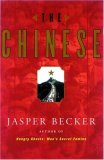Summary | Excerpt | Reviews | Readalikes | Genres & Themes | Author Bio

Critics' Opinion:
Readers' Opinion:
First Published:
Dec 2000, 304 pages
Paperback:
Feb 2002, 493 pages
Recent books have portrayed China as the next superpower, the new evil empire or as descending into chaos and civil war. As I was writing this book, a letter from a reader appeared in the South China Morning Post, declaring that: 'History shows that no country as large as China can hold together for long. Different political, ethnic and religious elements split such countries apart before long: look what happened to the Roman Empire or the USSR.'
Yet the immutability of the Chinese state is perhaps its most remarkable characteristic. The Roman Empire is no more but the Chinese state goes on much as before. In recent years the leading stories on China in Western newspapers have carried headlines such as these: 'Bureaucracy cut by half to save central government expenditure'; 'Honest officials praised in propaganda campaign'; 'Anti-corruption campaign nets top official'; 'Tough campaign launched to stop piracy and smuggling in southern coastal waters'; 'Beijing orders crackdown on subversive sect'; 'Government critics arrested and anti-government books burned'; 'New taxes levied to expand education'; 'Army generals rotated to ensure loyalty to centre'; 'Army suppresses rebellion by minority peoples in far west'. Exact parallels could be drawn from the reigns of any one of the 157 Chinese emperors. Only in China can one interview an official charged with civil service reforms who, in describing those reforms, recalls how officials of the Han dynasty (206 BC-AD 220) dealt with the problem of nepotism.
To understand the role of history in contemporary China, it is necessary first to look briefly at that history.
The Chinese bureaucratic state traces its origins directly back to the first Emperor of China, known as Qinshi Huangdi. Born in 259 BC, and therefore a contemporary of Hannibal, he became king of the state of Qin at the age of 13. Thirty-eight years later, Qinshi Huangdi had conquered all neighbouring states and had created what became known as the 'Middle Kingdom'. The word China stems from Qin, which was originally a small, impoverished state on the fringes of the Chinese world.
The Qin state lay in western China in what is now the province of Shaanxi, centred in the valley of the Wei River, a tributary of the Yellow River (Huang He) which is held to be the original birthplace of Chinese culture and the homeland of the Han people, as the Chinese now refer to themselves. The First Emperor established his capital in Xi'an, now the provincial capital of Shaanxi, and it is not far from there that his huge necropolis guarded by an army of terracotta warriors can be found. The Yellow River region, especially its upper reaches, is now regarded as denuded and backward, and the loess plateau through which the river winds is one of the poorest regions in China. Yet as well as Xi'an, the capitals of several later Chinese dynasties were established along its banks, at Luoyang and Kaifeng.
The success of the Qin state is attributed to the Legalist political system established in the time of Qinshi Huangdi's grandfather by his chancellor Lord Shang. Together they created an austere totalitarian society in which everyone informed on each other. As in Sparta, a centralized military bureaucracy enforced a harsh legal code, and the entire population was mobilized into 'productive occupations', either military service, farming or manufacturing -- this state had little use for merchants or intellectuals. Above all, however, in contrast to its neighbours, the Qin state destroyed the privileges of the feudal land-owning aristocracy. Everything was owned by the state and administered by a bureaucracy according to laws issued by the Emperor who enforced obedience through fear and terror. The laws and regulations were written down, and to enter the bureaucracy candidates had to pass written exams. Although the state encouraged education it also banned all books other than those it approved and forbade free discussion, public meetings and indeed any organization that was independent of the state.
Copyright © 2001 by Jasper Becker.





The Flower Sisters
by Michelle Collins Anderson
From the new Fannie Flagg of the Ozarks, a richly-woven story of family, forgiveness, and reinvention.

The House on Biscayne Bay
by Chanel Cleeton
As death stalks a gothic mansion in Miami, the lives of two women intertwine as the past and present collide.

The Funeral Cryer by Wenyan Lu
Debut novelist Wenyan Lu brings us this witty yet profound story about one woman's midlife reawakening in contemporary rural China.
Your guide toexceptional books
BookBrowse seeks out and recommends the best in contemporary fiction and nonfiction—books that not only engage and entertain but also deepen our understanding of ourselves and the world around us.